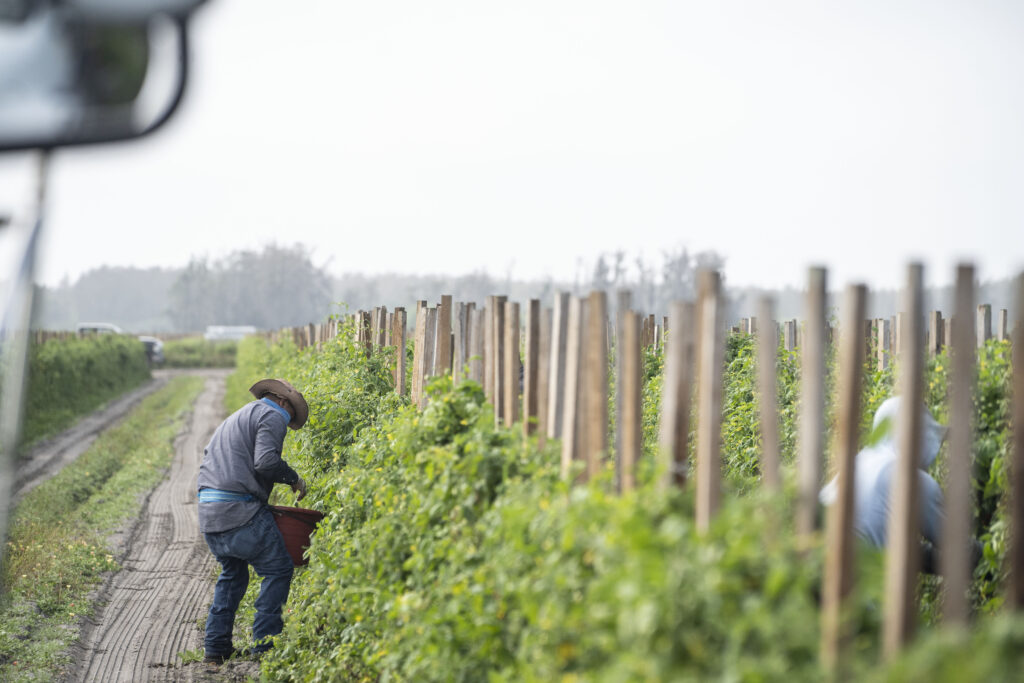
Groundbreaking academic investigation into labor conditions on farms certified under the Equitable Food Initiative (EFI) and Fair Trade USA (FTUSA) uncovers rampant abuse, wage theft, and retaliation against farmworkers in Mexico.
Anonymous farmworker on EFI: “The representatives of the EFI group are people close to [allegadas] the bosses or the foremen.”
Excerpt from statement by workers at Rancho Nuevo Produce: “Rancho Nuevo, where the Fair Trade and Equitable Food Initiative certifications exist to sell the produce more expensive in the United States without bettering the working conditions and the treatment of the worker.”
Over the past several years, a growing body of academic and journalistic research into the true impact of traditional corporate social responsibility schemes has laid bare the failure of those certification programs — including such well-known labels as Rainforest Alliance, Fair Trade USA, and the Equitable Food Initiative (EFI) — to monitor and enforce the standards they claim to uphold on certified farms, leaving workers unprotected and all too often vulnerable to retaliation on the rare occasions when they attempt to complain about abusive conditions. Now a new, groundbreaking investigation into the working conditions on EFI and FTUSA-certified farms in Mexico released just last month digs still deeper beneath this thin veneer of traditional corporate responsibility and reveals the labor abuses for all to see in a shocking report that deserves to be read in full.
Entitled “Fairwashing and Union Busting: The Privatization of Labor Standards in Mexico’s Agro-export Industry,” the article, by author James Daria, combines interviews with workers and cutting edge academic analysis to conclude that the high-profile certification programs provide customers in the US with a distorted view of the treatment of the farmworkers who harvest their food.
The ‘Fairwashing’ article focuses attention on Rancho Nuevo Produce, “a berry and tomato plantation subcontracted by San Diego–based Andrew & Williamson Fresh Produce (A&W).” Rancho Nuevo Produce is FTUSA certified and certified by EFI as well. In 2019, farmworkers there denounced their living and working conditions, harshly criticizing the company in a collective public statement:
“Rancho Nuevo, where slavery exists. Rancho Nuevo, where they don’t pay overtime. Rancho Nuevo, where you are fired if you raise your voice. Rancho Nuevo, where they demand quality but don’t pay quality wages. . . . Rancho Nuevo, where there exists a probusiness repressive union that defends the boss and not the worker. Rancho Nuevo, where the Fair Trade and Equitable Food Initiative certifications exist to sell the produce more expensive in the United States without bettering the working conditions and the treatment of the worker.”
The workers’ bold statement speaks for itself, but the author also gave voice to many of the individual farmworkers at Rancho Nuevo Produce. One told him, “The representatives of the EFI group are people close to [allegadas] the bosses or the foremen.” The report continues:
EFI claims that “both managers and workers have an increased sense of belonging and commitment to the organization. There is a shared purpose, and the ‘us versus them’ mentality is replaced with a continuous improvement approach.” However, according to this worker, “the bosses should not be involved in the EFI group, [and] it is because of this that we don’t have what the norms say we should have… I don’t feel enough trust exists to make a complaint because I know I am going to suffer retaliation tomorrow,” the Indigenous worker concluded.”
Another worker’s experience at a EFI and FTUSA-certified farm confirms this worker’s fears. After speaking out, he was fired and blacklisted:
“It was I who made the complaints of the mistreatment he [the mayordomo] showed us. And he went after me. It was he who put me on the layoff list [lista de recorte], so that they fired me because he didn’t want me to go around talking in the meetings [of the committee] that we had there. He didn’t want me to say anything about what was going on, of the mistreatment that he gave us in the area of fumigation, because sometimes we were sent to fumigate without protective equipment. This is one of the things that he didn’t want anyone to find out. They fired me.”
You can find the study in its entirety here.
********
This is Part Two of a series of posts on recent academic studies and policy announcements that show the key differences between the Fair Food Program — including its unique mix of monitoring and enforcement tools and unparalleled track record of measurable success — and the many other food certification programs that offer standards like those of the FFP but no realistic means to enforce those standards. Unlike those traditional Corporate Social Responsibility (CSR) programs, Worker-driven Social Responsibility (WSR) initiatives are built to deliver on their promises of humane labor standards, constructed of multiple, overlapping mechanisms designed to not just remedy human rights violations in corporate supply chains, but actually to prevent them.
Check out Part One here!
And keep an eye out in the coming days for the third and final installment in this series.
